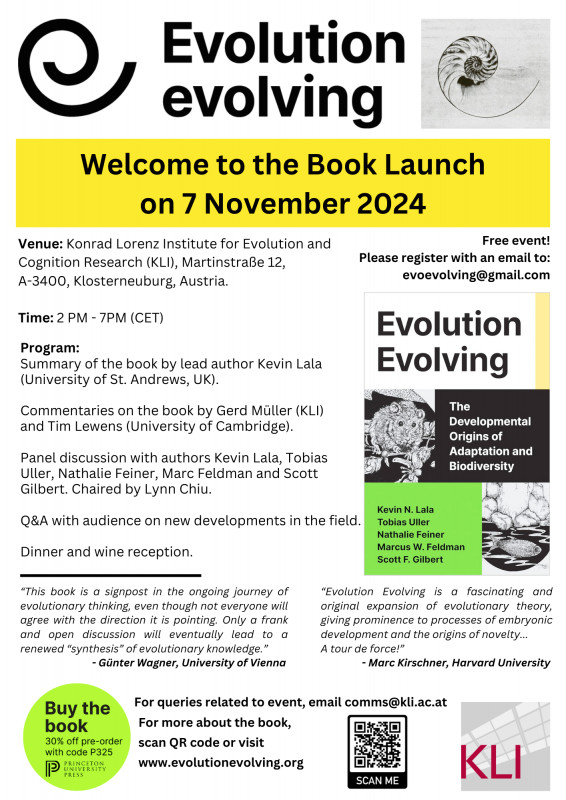KLI Colloquia are invited research talks of about an hour followed by 30 min discussion. The talks are held in English, open to the public, and offered in hybrid format.
Join via Zoom:
https://us02web.zoom.us/j/5881861923?omn=85945744831
Meeting ID: 588 186 1923
Spring-Summer 2026 KLI Colloquium Series
12 March 2026 (Thurs) 3-4:30 PM CET
What Is Biological Modality, and What Has It Got to Do With Psychology?
Carrie Figdor (University of Iowa)
26 March 2026 (Thurs) 3-4:30 PM CET
The Science of an Evolutionary Transition in Humans
Tim Waring (University of Maine)
9 April 2026 (Thurs) 3-4:30 PM CET
Hierarchies and Power in Primatology and Their Populist Appropriation
Rebekka Hufendiek (Ulm University)
16 April 2026 (Thurs) 3-4:30 PM CET
A Metaphysics for Dialectical Biology
Denis Walsh (University of Toronto)
30 April 2026 (Thurs) 3-4:30 PM CET
What's in a Trait? Reconceptualizing Neurodevelopmental Timing by Seizing Insights From Philosophy
Isabella Sarto-Jackson (KLI)
7 May 2026 (Thurs) 3-4:30 PM CET
The Evolutionary Trajectory of Human Hippocampal-Cortical Interactions
Daniel Reznik (Max Planck Society)
21 May 2026 (Thurs) 3-4:30 PM CET
Why Directionality Emerged in Multicellular Differentiation
Somya Mani (KLI)
28 May 2026 (Thurs) 3-4:30 PM CET
The Interplay of Tissue Mechanics and Gene Regulatory Networks in the Evolution of Morphogenesis
James DiFrisco (Francis Crick Institute)
11 June 2026 (Thurs) 3-4:30 PM CET
Brave Genomes: Genome Plasticity in the Face of Environmental Challenge
Silvia Bulgheresi (University of Vienna)
25 June 2026 (Thurs) 3-4:30 PM CET
Anne LeMaitre (KLI)
KLI Colloquia 2014 – 2026
Event Details

Book Launch Free and open to the public Please register!
Evolution Evolving (Princeton University Press)
To register, please send an email to evoevolving@gmail.com
For online* participation, please log in to the following Zoom link:
Meeting ID: 891 5985 6910
Passcode: 620244
Date: 7 November 2024 (Thursday)
Venue: KLI, Klosterneuburg, Austria
Time: 2:00 – 7:00 PM
Program
Summary of the book by lead author Kevin Lala (University of St. Andrews, UK).
Commentaries on the book by Gerd Müller (KLI) and Tim Lewens (University of Cambridge).
Panel discussion about the book with authors Kevin Lala, Tobias Uller, Nathalie Feiner, Marc Feldman and Scott Gilbert; chaired by Lynn Chiu.
Q&A session about the book and new developments in evolutionary biology
Dinner and wine reception.
.......................
See you there!
About the book:
Summary:
The title of this book – Evolution evolving – can be read in two ways. The first captures the idea that the evolutionary process itself evolves over time, and to this day is still evolving. That implies that the way in which each organism evolves depends critically on how that organism works, and on the evolutionary mechanisms those characteristics afford.
“The evolutionary process itself evolves over time, and to this day is still evolving”
Without undermining the central importance of natural selection and other Darwinian foundations, a new understanding emerging within the contemporary evolutionary sciences implies that, say, yeast, oak trees, and human beings may each evolve in different ways; indeed, that all organisms possess a characteristic set of evolutionary mechanisms, contingent on how they develop.
The second reading follows from the first. Evolutionary theory is evolving, not just through the steady accrual of new data and technologies, but perhaps in a more fundamental way, with the emergence of a new way of explaining evolutionary change. That is a second key idea that we explore in this book. New data call for new ways of thinking: ways in which developmental processes are situated more centrally within evolutionary explanation than they conventionally have been.
“Evolutionary theory is evolving, not just through the steady accrual of new data and technologies, but perhaps in a more fundamental way, with the emergence of a new way of explaining evolutionary change”
What the two readings of our title have in common – and the principal thesis that we defend in this book – is that developmental processes do more than impose constraints on selection: they also help explain adaptive evolution.
More about the book, authors, reviews and table of contents:
https://www.evolutionevolving.org/book/summary


